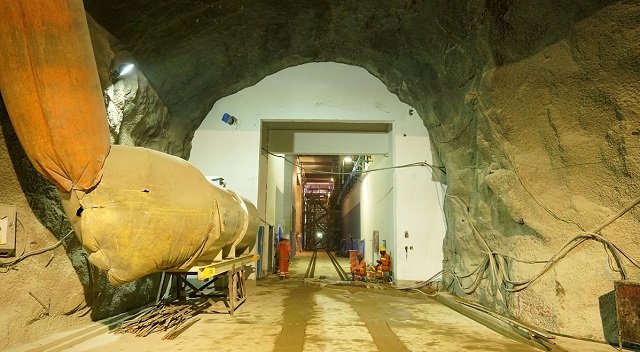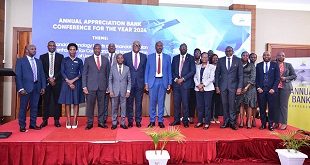
President said Africa should go to this high-level meeting with a common message on developing the continent’s energy needs
Kampala, Uganda | JULIUS BUSINGE | President Yoweri Museveni has advocated for a collective African voice at the upcoming climate change meeting in the United Arab Emirates, emphasizing the importance of articulating the continent’s development and energy needs.
In a recent speech delivered by Minister of Energy and Mineral Development, Ruth Nankabirwa, at the African Energy Week in Cape Town, South Africa, ahead of the Conference of the Parties (COP) in Dubai at the end of this month, Museveni stressed the significance of presenting a common message at the COP to the United Nations Framework Convention on Climate Change.
“Africa will continue working with global partners but this should be premised on mutual respect and partnership.”
His remarks were a continuation to defend Uganda’s move to invest heavily in the oil and gas sector despite some opposition to the project by environmental activists from foreign countries.
For Uganda, Museveni said, “We are proceeding with the oil and gas developments despite the attempted disruptions.”
Uganda reached the Final Investment Decision (FID) for its oil and gas sector last year in February ushering in the era of making investments between US$15-20bn to enable the country to get first oil in 2025.
Museveni said, commercializing the country’s oil and gas will provide funds for Uganda’s development and investment in more renewable energy sources and the achievement of energy access for all Ugandans.
In addition, he said, the project will produce Liquified Petroleum Gas which will be key in providing a cleaner cooking energy source that will save forest cover, that is being lost rapidly to charcoal and firewood.
“We should now focus on reducing potential emissions from the oil and gas operations and not stopping the development of oil and gas resources,” he said.
“For Uganda’s case, we are happy with the project developers who have designed the projects to technologically generate the lowest possible carbon footprint,” he added.
The COP is the decision-making body of the United Nations Framework Convention on Climate Change (UNFCCC) which came into force in March 1994. The 197 countries that have ratified the Convention are called Parties to the Convention.
The ultimate aim of the UNFCCC is to prevent “dangerous” human interference with the climate system.
Environmental activists argue that oil drilling and related projects like the East African Crude Oil Pipeline (EACOP) are a danger to the environment and could impede wildlife migration among other social risks.
However, oil companies are operating with clearance from the country’s environmental authority – the National Environment Management Authority (NEMA) which says that adequate mitigation measures have been put in place to protect biodiversity.
“11 wells have so far been drilled both at Tilenga and Kingfisher oil fields and more are going to be drilled,” Irene Bateebe, the permanent secretary at the Ministry of Energy and Mineral Development said in a live television interview on Oct.25.
Bateebe added: We have been very deliberate to work within the environment impact assessment guidelines as guided by the National Environment Management Authority and the international framework.”
Some activists have suggested that by the time Uganda starts production, its oil and gas resources will have no value because the world is moving away from oil and gas to renewable energy – which gives the impression that Uganda’s oil journey is progressing in disregard of environmental and social protection and global “energy transition”.
But Bateebe said, that when commercial quantities of oil and gas resources were confirmed in Uganda in 2006, the Government embarked on a process to ensure that the resources are utilized sustainably to create lasting value for Ugandans. This process dates as far back as 2008 when the National Oil and Gas Policy was put in place.
Ugandan delegates to COP 28 will have what it takes to defend the project. All relevant laws and policies have been put in place to lead to oil drilling which is underway at Tilenga and Kingfisher oil fields.
Museveni’s speech at AEW read in part: “All the projects fall within the category of “low emission”. The carbon dioxide equivalent (C02e) emission per barrel for Uganda’s upstream and midstream projects is estimated to be 20-45kg C02e. This is well below the global average of 70-100kg C02e.”
Uganda’s energy mix
Uganda’s energy mix is already dominated by renewables including hydro-power, solar, and biomass. The country’s strategy is to continue developing more of these renewable energy resources while developing its oil and gas which will provide the much-needed revenues for development and also Liquefied Petroleum Gas (LPG) that will help in the reduction of reliance on biomass for cooking and thereby improving the livelihoods of the people.
Beyond Uganda, Museveni said, for Africa to be able to effectively exploit its energy resources, it will need to overcome some structural bottlenecks regarding access to capital and the right technology as well as having the capacity of its people built.
The United Nations projects that by 2050, Africa’s population will reach close to 2.5 billion. Such a figure would mean that more than 25 per cent of the world’s population will be African.
The question is “Will Africa generate enough energy for all our people?” Museveni said the discussion on making energy poverty history must therefore continue if answers to these questions are to be availed.
As we talk about energy, Museveni said, the main challenge for Africa now is how to achieve universal access to reliable, affordable, and modern energy for the people as well as stipulated in the Sustainable Development Goals.
The current energy situation caused by the conflict between Russia and Ukraine where developed countries are resuming the use of coal and energy prices escalating demonstrates the importance of energy in the smooth operations of society and should teach Africa a lesson in ensuring it pursues energy independence, Museveni said.
“It also underpins the need for the transition to be handled in a systematic manner that addresses issues of demand and supply of this important resource,” he said.
Meanwhile, Museveni said, with its rapidly growing population, Africa will continue to be a growing market for goods and services including energy.
“It is therefore unsustainable for the continent to continue being a net exporter of crude oil and a net importer of refined products,” Museveni said, “African resources should therefore be able to meet the demand for energy of the continent.”
The continental market should also be exploited by empowering the people to be able to consume the energy including oil and gas produced on the continent.
 The Independent Uganda: You get the Truth we Pay the Price
The Independent Uganda: You get the Truth we Pay the Price


